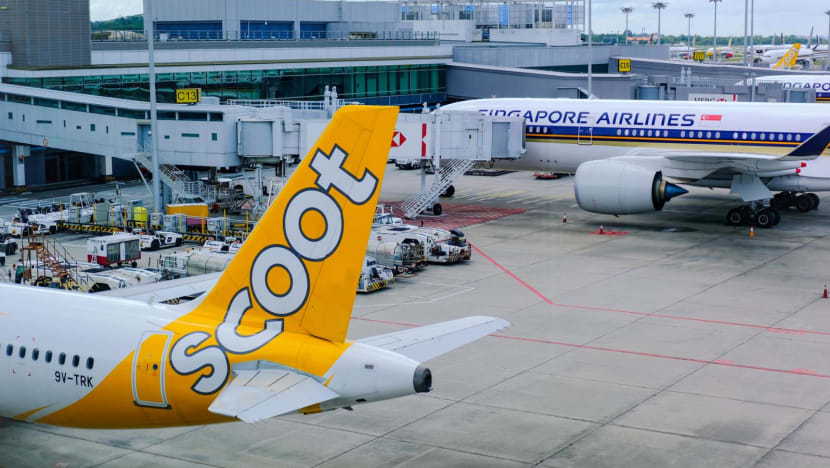Some flights to Europe, New York may take 'slightly longer' as SIA, Scoot avoid Iranian airspace again
Other Asian carriers, such as India Air and Thai Airways, have also re-routed flights due to mounting tensions in the Middle East.

Scoot and Singapore Airlines planes parked at Changi Airport on Jul 2, 2020. (File photo: iStock/Kandl)

This audio is generated by an AI tool.
SINGAPORE: Several Asian carriers, including Singapore Airlines (SIA), have stopped flying over Iranian airspace as fears grow over an escalation in tensions in the Middle East.
In response to CNA's queries, SIA said its flights, as well as those by Scoot, its low-cost unit, have stopped flying over Iranian airspace and started using alternative routes.
This came into effect on Friday (Aug 2) at 1.30am.
"All SIA flights operating between Singapore and Amsterdam, Brussels, Copenhagen, Frankfurt, Istanbul, London, New York (JFK), New York (Newark), Manchester, Milan, Munich, Paris, Rome, and Zurich, as well as all Scoot flights operating between Singapore and Athens, are affected," said SIA.
No flights have been cancelled, it added.
The rerouting may result in "slightly longer than usual" travel times for some flights, said the carrier.
"SIA will be assisting affected customers to re-accommodate them on alternative flights, should there be a misconnection due to an extended flight time."
"We will continue to closely monitor the situation in the Middle East, and adjust our flight paths as needed."
SIA only resumed flying over Iranian airspace on Jun 27, having previously stopped doing so for more than two months as a "precautionary measure".
SIA's earlier decision to bypass Iran came after Iran vowed retaliation over a presumed Israeli air strike on Apr 1.
According to data from Flightradar24, EVA Air and China Airlines flights from Taipei to Amsterdam on Friday appeared to be make a detour from their usual path over Iran as well.
Thai Airways said it had also stopped flying over Iranian airspace, while India Air added it had suspended flights to and from Tel Aviv until Aug 8.
These changes come as concerns over the growing possibility of a wider Middle East conflict after senior members of militant groups Hezbollah and Hamas were killed this week.
On Tuesday, top Hezbollah commander Fuad Shukr was killed in an Israeli strike in Beirut.
According to Israel, this was in response to a strike in Golan Heights on Saturday, which left 12 young people, including children, dead.
Hamas said on Wednesday that its chief Ismail Haniyeh was killed in Tehran and Israel's military confirmed the death of the military leader of the Palestinian militant group, Mohammed Deif, a day later. He had been targeted in a strike on Jul 13.
Israel has only commented on Shukr’s and Deif's killings, but Iran and its regional allies have blamed the country for the deaths, promising retaliation.
Israel, however, warned its adversaries on Thursday they would "pay a very high price" for any "aggression".
Listen:
AVOID IRANIAN, IRAQI AIRSPACE, SAYS ADVISORY
In a bulletin, OpsGroup, a membership-based organisation that shares flight risk information, advised traffic between Asia and Europe to avoid Iranian and Iraqi airspace.
This comes a day after sources told Reuters that top Iranian officials would meet the representatives of Iran's regional allies from Lebanon, Iraq and Yemen to discuss potential retaliation against Israel.
Should an all-out war break out in the Middle East, OpsGroup said civil aviation will likely face the risk of drones and missiles crossing airways, as well as the increased risk of GPS spoofing.
GPS spoofing is a growing phenomena around Lebanon and Israel, where militaries and other actors broadcast signals that trick a plane's GPS system into thinking it is somewhere it is not.
Besides Asian carriers, other global airlines have also taken precautions.
Over the past two days, Germany's Lufthansa, United Airlines and Delta Air as well as Italy's ITA Airways said their flights to Tel Aviv have been suspended.
Canada on Thursday issued a notice to Canadian aircraft to avoid Lebanese airspace for one month due to the risk to aviation from military activity.
Britain has for the past month advised pilots of the potential risk from anti-aircraft weaponry and military activity in Lebanon's airspace.
Many airlines, including US and European airlines, already avoid flying over Iran, especially since the reciprocal missile and drone attacks in April between Iran and Israel.
















